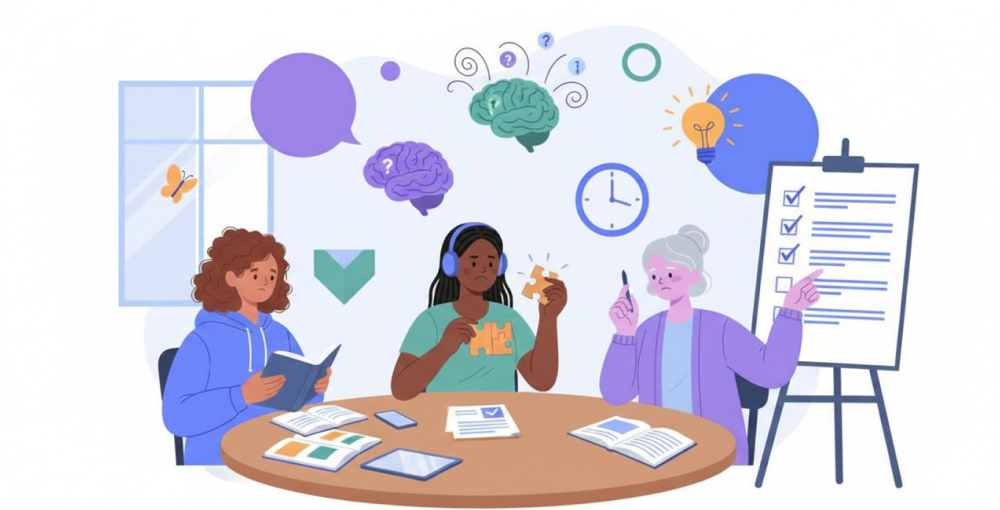Understanding ADHD in Women: the Role of Assessments

Take ADHD Test for Women
Get StartedAttention Deficit Hyperactivity Disorder (ADHD) is often underdiagnosed in women, as the symptoms can manifest differently compared to men. Recognizing ADHD in women is crucial for proper management and improving quality of life. This article delves into the various aspects of ADHD assessment, specifically tailored for adults. We’ll explore the necessity of assessments, the ideal tools for diagnosis, and how to approach testing.
Why ADHD Assessment is Essential for Women
ADHD has been historically associated with hyperactivity in young boys, leading to misunderstanding and misdiagnosis in women. Many adult women remain undiagnosed due to societal expectations and gender norms. These assessments are tailored to identify less obvious symptoms, which might include inattentiveness, forgetfulness, and chronic disorganization.
Women may often mask their symptoms, attributing issues to external stressors or personal shortcomings. This makes an ADHD self-assessment for women a valuable first step. Women should prioritize this evaluation to access appropriate treatments that can enhance their well-being and daily functioning. A specialized assessment helps differentiate between ADHD and other conditions, ensuring an accurate diagnosis.
Steps Involved in ADHD Assessment
Before proceeding with a formal diagnosis, understanding the process can alleviate anxiety connected with testing. The first step usually involves a ADHD diagnosis online preliminary screening. This is followed by comprehensive interviews, self-reported questionnaires, and observations that inspect behavioral patterns. These steps help compile a detailed profile for a clinician to analyze.
Effective assessment should incorporate both objective and subjective data. Clinicians may use several methods including neuropsychological tests, cognitive assessments, and interviews with relatives or partners, to gain a holistic view of the individual’s challenges. The goal is to ensure a thorough and empathetic assessment, leading to a tailored intervention plan.
Tools for ADHD Women Assessment
- Self-Reporting Questionnaires – Provide insight into individual perceptions of behavior.
- Structured Clinical Interviews – Offers a more detailed understanding through conversation.
- Behavioral Rating Scales – Used to cross-reference observed behaviors against standardized scales.
- Computer-Based Tests – Assists in tracking attention spans and impulsivity objectively.
Each tool has its own advantages, allowing for a tailored approach to each case. ADHD test for women should be sensitive to gender-specific nuances. Clinicians focus on creating a comfortable environment, encouraging honesty, and capturing authentic behavior for accurate assessment.
Significance of Testing for Adult ADHD Women
The landscape of adult ADHD is changing, shedding light on the unique challenges faced by women. Improved diagnostic criteria and growing awareness allow for better identification of ADHD in this demographic. ADHD women assessment often requires a nuanced approach, discerning subtle cues often overlooked.
Women over 50 present an additional layer of complexity. Symptoms can overlap with menopausal changes, complicating the diagnostic process. Nevertheless, experts emphasize the timeliness of assessments to enhance life quality, reduce stress, and enable effective management strategies. ADHD in women over 50 requires focus on lifelong well-being over acute symptom management.
Potential Outcomes of ADHD Diagnosis for Adult Women
Once a ADHD diagnosis for adult women is confirmed, multiple strategies can be considered for management. Treatment plans often encompass medication, behavioral therapy, lifestyle adjustments, and support groups.
Understanding one's own diagnosis is empowering. It facilitates communication with family and coworkers about needs and challenges. Additionally, it aids in forging connections with others undergoing similar experiences. Diagnosis is not an end but a beginning towards managing ADHD effectively and living a fulfilling life.
FAQs
| Question | Answer |
|---|---|
| How can ADHD self-assessment benefit women? | It provides a preliminary insight that can guide them toward professional help. |
| What are the common symptoms of ADHD in adult women? | These include inattentiveness, forgetfulness, anxiety, and mood swings. |
| Can ADHD in women be diagnosed online? | Initial screenings can be completed online but a formal diagnosis requires a detailed assessment from a healthcare professional. |
| Does ADHD testing differ by gender? | Yes, assessments for women consider different symptom presentations and societal factors. |
| Are there any specific tests for ADHD in women over 50? | Tests may be tailored to include considerations for hormonal changes and life stage challenges. |
Through understanding, ADHD diagnosis online can optimize testing experiences and support women in managing their ADHD. This evolving awareness contributes to the creation of inclusive approaches in assessment and management.
